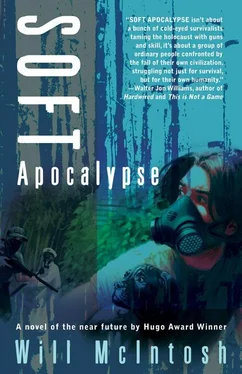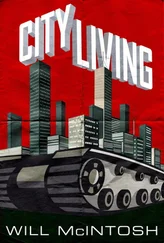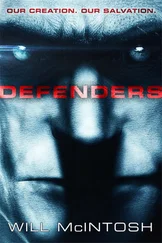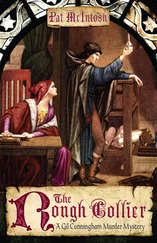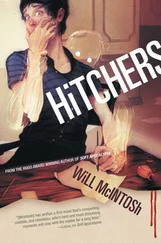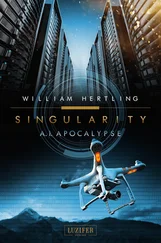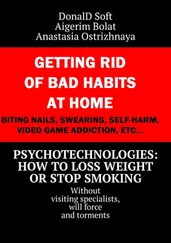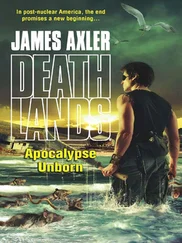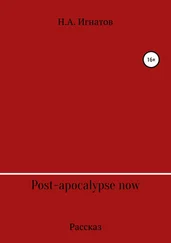Over the left field wall, there was a flash, and a hot boom. People in the stands screamed, leapt to their feet. The ballplayers sprinted for the dugouts, looking back over their shoulders at the explosion, which was a good thirty blocks away. It looked like an expanding rainbow of colors, like ripples in a candy pond.
I looked at Ange. “Shit,” she said.
It could be anything—chemical, biological, nuclear, or an accident at a crayon factory.
We waited for most of the stampeding crowd to exit, figuring their panic could kill us as easily as chemical weapons, then we fled.
The streets were filled with the sound of breaking glass and shouting, which was not unusual. There was something else, though—a thrumming that registered deep in my stomach, like the beating of drums. Mortar fire, or maybe tanks, far away. Closer, we heard the pop of gunfire, which was also not that unusual, only there was more of it than usual.
Screams rose from the direction of Waters Avenue, cutting through the other noises. Ange’s phone rang.
“You guys okay?” Ange said. I could hear Colin’s voice in the phone. “Shit,” Ange said. She turned to me. “Your building’s on fire.”
I started running.
“Hold on. It’s okay, they’re out, they’re safe,”Ange said. She grabbed my sleeve, slowed me down.
“Jeannie’s okay?” I asked.
“Jeannie’s fine. Baby still on board.”
“Where are they?” I asked, relieved to hear that Jeannie hadn’t lost the baby. With no access to a doctor, her pregnancy was such a tenuous thing.
“Outside your building,”Ange said. She told them we’d meet them there.
We passed a building with red flames licking out of a boarded up window. A siren wailed in the distance. It wasn’t the wah-wah siren of an ambulance, and the police never used their sirens any more—they didn’t want people to hear them coming.
“I already called the fire department,” an old guy standing on the sidewalk said, seeing us peruse the flames as we hurried by.
“You called the fire department?” I said.
“They’re on their way.” Purple veins blossomed on the guy’s cheeks and nose. He was probably a drinker, passing dull nights in his apartment sipping moonshine while he watched old TV shows where cops solved crimes and firemen ran into burning buildings to save crying babies.
We picked up our pace. “They’re bad news. Get away while you still can,” I shouted back.
The crack of gunfire and the booming of explosions was everywhere. Something was happening.
A baritone honking announced the big red truck before it careened around the corner. It was crawling with firemen, their faces painted red, their helmets festooned with illustrations. The truck was immaculate, the polished chrome blinding in the sunlight.
We cut into an alley. It was packed with homeless, milling around, looking ready to bolt if they could only figure out which direction to go. I thought of our apartment burning with all of my possessions in it. I didn’t have much to lose, but when you don’t have much, it sure hurts to lose what you have.
The pop-pop of gunfire was constant. Crowds of people were running in every direction. A helicopter roared overhead, just above roof level. In the east, where the explosion had been, the horizon glowed red—it looked as if everything in that direction was on fire now.
We spilled out onto Drayton. A tight cluster of Civil Defense guys with machine pistols rounded the corner and headed in our direction. We ducked into a doorway, stared at the bricked pavement until they passed. I had no idea what the rules were, what might get us shot, who might do the shooting. I struggled to understand, to put a label on this thing that was happening. It was a war, the city was at war—that was clear. But wars had two sides, and this had twenty sides, or fifty, or maybe no sides.
We cut down another alley, past people hiding behind a green dumpster. Others stared down at us from the safety of open windows in locked apartments. Above them, on the roof, were flocks of boys with guns.
Ange’s phone rang again. “Where are you?” she said, plugging her free ear.
“It’s Sebastian,” Ange said to me. “He says we need to get out.”
“Out of the city?”
Ange nodded.
“But Jeannie’s eight months pregnant!”
Sebastian said something. Ange held up a finger. “Okay, see you there.” She hung up.
“He said we don’t have a choice, things are going to get bad.”
I thought of what that economist in the wheelchair had said three years ago, during our speed-dating session. It’s not going to turn around; it’s going to get worse, and then it’s going to collapse completely.
Sebastian was going to follow the railroad tracks out of town. That made sense, to get off the roads, but the thought of the railroad tracks sickened me. It reminded me of our tribe days.
A woman screamed in one of the apartments above us. She screamed again, forming the outline of a word. It sounded like “help.” She screamed a third time, and this time it was clear she was calling for help.
Ange called Jeannie back and got them moving in our direction.
“I should warn Ruplu,” I said. We made the two-block detour to Abercorn Street, and turned the corner into an inferno. Flames roared over the roofline of the Timesaver. Ruplu was nowhere to be seen. I called him.
“It’s gone, Jasper,” he said. “Everything we worked for is gone.”
“I know. I’m so sorry.” I spotted Colin and Jeannie up ahead, raised my hand. They waved back. “Listen, we’ve been told by our scientist friend that we need to get out of the city. It’s not going to be safe here.”
There was a long silence on the other end. “Are you sure?”
“Pretty sure, yes. This guy has friends in Atlanta. They say things are going to get very bad.”
“All right, then. Thank you, friend.”
I suggested he and his family meet up with us, but Ruplu said if he needed to leave, his uncle had a little boat, and they would head down the coast to stay with relatives in Saint Augustine. That seemed like a good plan.
We joined up with Colin and Jeannie and headed toward Thirty-eighth Street.
My phone rang: I recognized the number, but I couldn’t connect it with a face. I answered it, too breathless to do more than gasp in lieu of a hello. We’d stopped running and were hugging the edge of doorways.
“I need you,” Deirdre said. She was crying. A tingle of shock ran up my balls.
“I can’t,” I said.
“You can’t what ?” she said. “I don’t know where to go. There’s nobody…” she trailed off, crying. It was an angry, outraged crying.
“I can’t get to you. I’m not home,” I said. “We’re leaving.”
“I’m coming with you.” I didn’t respond.
“Please!” she added.
“Who is it?” Jeannie asked.
I covered the mouthpiece of the phone. “Deirdre. She wants to come.”
“Oh Christ! No. No way,” Jeannie said.
“What can she bring?” Colin said. It was a shock to hear Colin put it so bluntly. If you bring a keg, we’ll invite you to our party. But given the situation I guess he saw no choice but to be pragmatic. I’ve heard a lot of people say that having a child changes you.
We were crossing Thirtieth Street. We had to step over a body stretched across the sidewalk, covered with bloody bullet wounds.
“What can you bring if we let you come? Do you have money?”
“Three thousand,” Deirdre said. “A gun. Two kils of energy.”
I turned to Colin. “Money, gun, energy.” He nodded, and so did Ange. Jeannie cursed.
“Tell her to bring water filters if she has any,” Colin said.
“Get to Thirty-eighth Street,” I said into the phone. “Follow the railroad tracks east out of town until you catch up with us. Bring water filters if you have any. We’ll move slowly, but you’d better move your ass, because we won’t move slowly for too long.”
Читать дальше
